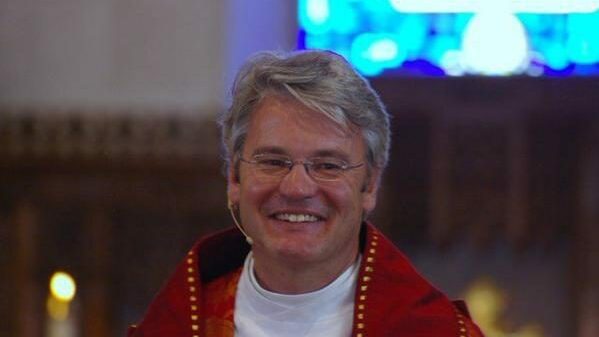Anglican Priest Shares Why He Is Leaving the Pulpit After 28 Years to Support IJM

London, Ontario, Canada, May 31, 2015
Kevin Dixon is the former dean at St. Paul’s Anglican Cathedral in London and now serves as vice-president of operations for International Justice Mission Canada.
After 28 years of work as a priest in the Anglican Church, I recently hung up my clerical collar for a job with International Justice Mission, a global organization protecting the poor from violence throughout the developing world.
Some of my former parishioners were left scratching their heads: why would I resign my position at St. Paul’s Cathedral in London? Had I lost my faith?
Not at all. It was a decision motivated by a desire to do something the church has always tried to do, in which International Justice Mission specializes.
I love the church. The church teaches that God’s desire is to work through people to overcome injustice and replace it with what the Bible calls shalom, peace with justice.
It’s just that churches have a very broad mandate: to teach, nurture new believers, worship God as well as do justice. For this reason, it is important for individuals within the church to shoulder the mission to which they feel called. As Danish philosopher Søren Kierkegaard recognized, in the face of many things competing for attention, our prayer ought to be for the collectedness to will one thing.
This is what motivated my desire to change jobs. There is so much injustice in the world. And during my career as a priest, I often heard people ask, "Why would a good God allow so much suffering?”
I came to a conviction that, for me, there can be no higher priority than to fight suffering by standing up for justice. For me, this is the one thing. What’s the point of praying for God to fight against suffering and injustice if I’m not willing to do the one thing I can do?
Canadian musician Bruce Cockburn vividly expresses the desire to defeat injustice when he sings, "Nothing worth having comes without some kind of fight / Got to kick at the darkness ’til it bleeds daylight.”
Injustice thrives in dark places. An organized response is required.
International Justice Mission is determined to will one thing: to end violence against the poor in the developing world. IJM goes into places of lawlessness where most are scared to go and, using a proven method, brings light: hope, rescue, safety, restoration. IJM overcomes violence by partnering with local authorities in 18 field offices around the world to rescue victims, bring criminals to justice, restore survivors of violence, and strengthen justice systems. It is a method that changes lives and communities. It not only addresses the symptoms, but also disables the cause of violence.
IJM’s will to do this one thing challenges and inspires me. The poor are more vulnerable to violence when public justice systems fail to protect them. And the results are devastating.
Globally, 35.8 million people are enslaved, according to the 2014 Global Slavery Index, and one in four of those slaves is a child. There are more slaves today than were extracted from Africa during 400 years of the transatlantic slave trade.
There’s more: after the drug trade, human trafficking is the largest criminal industry in the world and the fastest growing. Every year, five million people are victimized by forced evictions. Worldwide, one in five women will become a victim of rape or attempted rape in her lifetime. In Bolivia, if someone sexually assaults a child, he is more likely to die from slipping in the shower than ever being convicted for his crime.
The numbers are overwhelming. Gary Haugen is a human rights lawyer who served as the UN’s lead investigator into the Rwanda genocide in the 1990s and then became the founder and chief executive of IJM.
In his 2014 book, The Locust Effect: Why the End of Poverty Requires the End of Violence, he says, "Without the world noticing, the locusts of common, criminal violence are right now ravaging the lives and dreams of billions of our poorest neighbours.” (Watch him expand on this theme in his TED Talk: IJM.ca/TED)
Thanks to generous financial support from individuals, churches, groups and foundations, progress is being made.
Last month, for example, 11 suspects were arrested at a high-end entertainment bar in the Philippines where women and girls were being trafficked and exploited for sex. This complex operation involved staff from all three of our offices in the Philippines and close co-ordination between national government agencies and the local anti-trafficking unit.

In February, IJM assisted in the rescue of 333 children, women, and men from forced labour slavery in Chennai, India. Afterward, Saju Mathew, IJM vice-president of operations for South Asia, said, "This rescue operation is a game-changer. When we started working a decade ago, officials either hadn’t heard of bonded labour or denied that it existed in their state. A large-scale operation like this would have been unimaginable.”

Here at home, we invite Canadians into the work of justice through financial support, prayer, and educational campaigns. Students have the opportunity to participate in internships at IJM field offices. Churches and community groups frequently invite IJM speakers to tell the story of why and how we have the will to do this one thing: end violence.
From our Canadian headquarters, we oversee the work overseas. It ought to be a point of local pride that such important work flows from London.
For my part, I will continue to encourage churches — and anyone else who has the will to do this one thing — to kick at the darkness. My hope, indeed my prayer, is for people not to settle for a response to the symptoms of suffering without seeking to remedy the underlying injustices that triggered the suffering in the first place.